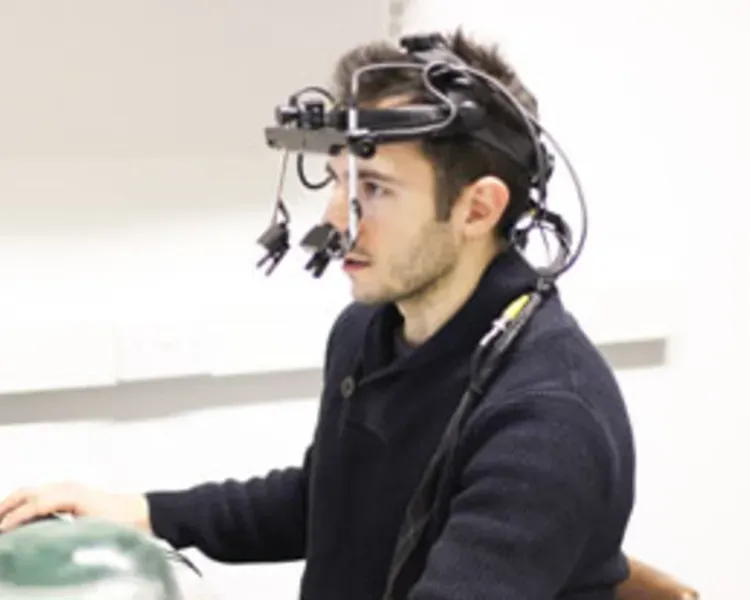Psychology research degrees
Our postgraduate research in psychology including entry requirements for PhDs and other research degrees.

- Clinical
- Cognitive
- Cognitive neuroscience
- Developmental
- Social
We aim to transform lives by consulting and collaborating with local councils, charities and corporations with particular focus on the themes of Social Inclusion & Health and Challenges in Human Communication & Learning.
Our current research topics include:
- Cognition – e.g., decision making; emotional processing. Sample topics:
- How do people make health-related decisions (e.g., food choice)?
- How do emotions affect every-day cognitive processes?
- Psycholinguistics (Psychology of Language) – e.g., second language acquisition; language development; language processing (comprehension & production). Sample topics:
- How do adults learn their second language?
- What are the underlining factors to make some people learn better than others?
- Development Psychology – e.g., cognitive and social development. Sample topics:
- How do babies and children learn about themselves (vs. others)?
- How do they learn to communicate with others?
- Social & Health Psychology – e.g., health and mental well-being in society; minorities in society. Sample topics:
- How could people’s mental health be improved in community settings?
- Culture, Mind, Well-being. Sample topics:
- How does ‘culture’ affect people’s behaviours, including cognition and mental health?
- How can each ‘culture’ learn from each other to improve its education at school?
PhD opportunities in Psychology
Entry requirements
Honours degree at 2.1 or above in a relevant discipline.
In certain circumstances we may ask you to spend a year completing our Master's degree in Psychological Research Methods before you commence your doctoral research. The decision about the suitability of your qualifications is made by the potential supervisor and the schools postgraduate advisor.
English language requirements
| IELTS (overall) | Reading | Listening | Speaking | Writing |
| 6.5 | 5.5 | 5.5 | 6.0 | 6.0 |
We also accept other English language qualifications
You do not need to prove your knowledge of English if you are a national of certain countries.
Don't meet the English language requirements?
English language programmes
Prepare for university study and benefit from extra English tuition with an English language programme.
Psychology PhD tuition fees
| Academic year of entry | Scottish/Rest of UK fee status | International fee status |
|---|---|---|
| 2024/25 | £4,786 per year of study |
£21,940 per year of study |
| Academic year of entry | Scottish/Rest of UK fee status | International fee status |
|---|---|---|
| 2025/26 | £5,006 per year of study |
£21,940 per year of study |
Tuition fee per year of study (subject to a 3% annual increase for Scottish/Rest of UK students and a 5% annual increase for International students).
The tuition fee, and mode of attendance shown within the application system is provisional and confirmed when you are made an offer.
Part time study, where available, is charged on a pro-rata basis.
Scottish/Rest of UK fee status annual increase
Each year, UKRI sets a recommended fee and stipend level for Scottish/Rest of UK students, which we use as the basis for fees charged to this group.
UKRI usually increases its fee and stipend levels in line with inflation, based on the Treasury GDP deflator.
Therefore, the Scottish/Rest of UK fees detailed in this table for 2025/26 (and beyond) can only be estimated according to the typical increase.
The fee charged to you may differ, though only slightly, from the figure given.
Types of PhDs
3-year PhD
You may be offered a 3-year PhD if:
- you have an existing MSc that included extensive research skills training
- a well-developed research proposal
We may also take into account if you have any professional experience that you may have. Particularly if this includes significant research expertise.
3.5-year PhD
You may be offered a 3.5-year PhD with Research Training course if:
- you have an existing MSc that included some research skills elements
- you are transferring from another disciplinary area with different research skills
- you are undertaking an interdisciplinary PhD with different skills needed
- you need to further develop your proposal
These means that you need additional skills to undertake your PhD.
4-year PhD
You may be offered a 4-year PhD with Research Training course if:
- you have an existing MSc that did not include research skills
- you are moving from one discipline to another in social sciences. The other discipline may have had completely different research skill needs
- you do not have a well-developed research proposal
An assessment of your application by School staff will determine which of the three pathways you may be offered.
Apply for a research degree
You can apply for a PhD or other postgraduate research degree using our Direct Application System.
We have three start dates per academic year.
PhD Psychology
- Apply to start in January 2025
- Apply to start in May 2025
- Apply to start in September 2025
- Apply to start in January 2026
- Apply to start in May 2026
Psychology (non-graduating) (research)
Disabled students
The University of Dundee welcomes applications from disabled students.
Enquiries
person
